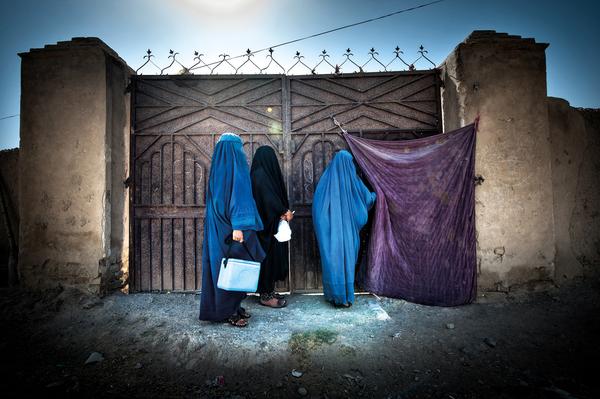Polio: The eradication endgame
by Cassandra Willyard in the Journal Nature

Photo by Agron Dragaj Female vaccinators — often the only ones allowed to speak to mothers or enter a child's home — wait outside a house in Afghanistan.
Researchers are developing a strategy that could put an end to polio forever.
In 1988, scientists around the world launched a massive effort to eliminate polio, a disease that can cripple and kill. The Global Polio Eradication Initiative (GPEI) has since made great progress: the number of polio cases has fallen by more than 99%, from an estimated 350,000 cases in 1988 to around 400 in 2013. And in January, India, once a stronghold for polio, celebrated an important milestone: three years with no new cases. Yet poliovirus stubbornly persists in Nigeria, Afghanistan and Pakistan, where violence, politics and mistrust have hampered eradication efforts. Indeed, in early 2014, Kabul saw its first case of polio since 2001. In 2012, the GPEI issued a dire warning: “Polio eradication is at a tipping point. If immunity is not raised in the three remaining countries to levels necessary to stop poliovirus transmission, polio eradication will fail.”
In chess, the final moves must be carefully planned, as one mistake can let your opponent gain the upper hand. It's the same with the polio endgame. Violence has made delivery of the vaccine nearly impossible in some regions. In others, fear and mistrust have led parents to refuse to have their children vaccinated. But there is another, seldom discussed, obstacle to eradication: in rare cases, the live, attenuated (weakened) virus in the oral polio vaccine (OPV) can mutate and spark polio outbreaks.
In April 2013, the GPEI presented a new strategy to wipe out polio — not only the wild virus, but also polioviruses derived from OPV. The plan is to introduce inactivated polio vaccine (IPV), which contains killed virus, in the 124 countries that rely on OPV by 2015. A more effective oral vaccine will then be used to eliminate the last pockets of virus. Once the world is free of polio, the oral vaccine can be phased out entirely. Introducing IPV in so many countries will pose a “major challenge”, says Elizabeth Miller, an epidemiologist who chairs the polio working group of the Strategic Advisory Group of Experts (SAGE) on Immunization. “On the other hand, it offers huge rewards in terms of progress towards eradication.”
Click here to go to full article on Nature website
Download the website sponsorship guide


